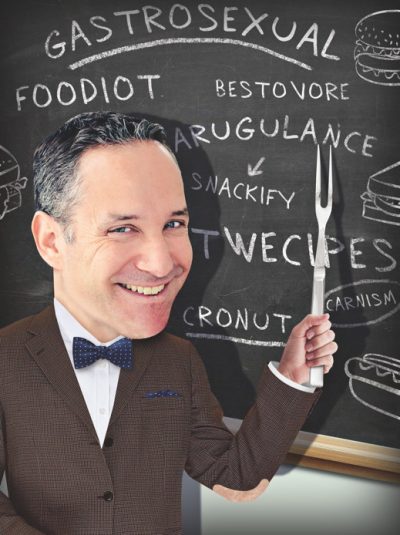
Josh Friedland may be the only person who ever failed to show up to receive a James Beard Award, not because he couldn’t attend the ceremony but because it would mean revealing his identity.
It was 2011, and foodies were in conniptions trying to figure out who was writing the devilishly satiric tweets of a character named Ruth Bourdain—a comic mash-up of Ruth Reichl’s fey musings and Anthony Bourdain’s maximally macho declamations. The creator was clearly a well-versed food insider, giving rise to some erroneous outings. The James Beard Foundation thought it had the perfect catnip. It bestowed its first-ever award for humor writing on Ruth Bourdain, but he or she didn’t take the bait.
By the time Friedland, who lives in Maplewood, voluntarily outed himself to the New York Times in 2014, the joke having worn thin, he had banged out an astonishing 2,700 tweets for Ruth Bourdain’s 70,000 followers. He had even written a book under the pseudonym: Comfort Me With Offal, the title tweaking Reichl’s 2001 Comfort Me With Apples.
“It was hard to market a book and do interviews when you’re keeping your identity concealed,” Friedland admits. “I did a couple radio interviews with voice cloaking, but other stations didn’t want that.”
So it was back to the carving board. Friedland, 45, is indeed an insider, having created the pioneering gastronomy website thefoodsection.com in 2003. He is an avid cook (though these days, as a divorced dad, he mostly cooks for his two children, Anya, 10, and Asher, 6). Peel one more layer of the onion and you uncover a skilled researcher with a 1991 bachelor’s degree and a 1995 master’s degree, both in political science, both from UCLA. In those years, Friedland contributed to a project annotating the many speeches and papers of the pan-African activist Marcus Garvey.
“I liked doing that, unpacking the history, looking into the story behind an individual or any kind of historical reference,” Friedland says. After retiring Ruth Bourdain, Friedland decided to “take a social science sort of approach” to developments in the food world, particularly the neologisms he had begun to track at thefoodsection.com in 2009.
The delightful and scrupulously annotated result, out this month, is Eatymology: The Dictionary of Modern Gastronomy (Sourcebooks, $12.99). In it, you will find 100 variously clever, useful, spoofy, disturbing, but in every case real new food terms, from aporkalypse (“a calamitous event involving a precipitous decline in the supply of pork”) to zip code winery (“a winery whose vineyards may be located in one place but that seeks to associate itself with a more desirable wine-making region”).
Along the way, you can graze on tasty new terms such as arugulance (“a perceived attitude of superiority and snobbery manifested in a predilection for pricey—yet delicious—peppery greens”); the Mimi Sheraton coinage bestovore (“one who eats foods they deem to be the best in taste and quality whenever possible, regardless of their geographical origin”); foodiot (“a fervent gastronome whose outsized obsession with food infuriates others”) and gastrosexual (“a person, typically male, who embraces cooking as part of his sexuality and deploys…culinary aptitude to attract romantic partners”).
Where Friedland’s scholarly soul rises like cream, giving the book its sociological depth, is in the paragraphs that appear below each of these concise definitions. The first paragraph is always “Origins.” For example, snackify (“food industry term for the process of transforming beverages into snack-like food products”) Friedland traces to a 2010 announcement by PepsiCo CEO Indra Nooyi that the company was developing products like kefir because “we see the emerging opportunity to ‘snackify’ beverages and ‘drinkify’ snacks as the next frontier in food and beverage convenience.”
The subsequent paragraphs, each with their own headings, broaden the picture. The second paragraph under carnism (“an ideology or system of beliefs that supports the choice to consume meat”) is headed, “Meat PTSD.” Friedland writes, “The Carnism Awareness and Action Network claims that individuals working in the meat procesing industry who have witnesed violence against animals can suffer from ‘carnism-induced trauma…’”
Where does he get this stuff? If you’re not satisfied with what the entries themselves tell you, just flip to the 36-page “Sources” section in back, where the type gets teeny and the references ripple far and wide.
Charmingly titled, Eatymology (the nod to Mario Batali’s Eataly doesn’t hurt) is serious fun. If some words seem preposterous, they all show the wonderful plasticity of the English language and the frenetic dynamism of today’s food scene.
You might sniff political correctness behind 2009’s vendrification (“the process by which an influx of fancy food trucks selling gourmet treats threatens to displace established street vendors and restaurants”). Male ego is the culprit in egotarian cuisine, coined in 2014 by GQ restaurant critic Alan Richman to bemoan food in which “every chef is seeking to express himself in an incomparable and triumphant manner.”
What’s really going on, Friedland says, is “a fetishization of food.” He credits New York magazine restaurant critic Adam Platt with picking up on the phenomenon in 2006, when Platt coined haute barnyard to describe the look of a restaurant outfitted with a long communal table, rustic chalkboards, herbs in the bathroom and pictures of animals on the walls. In the haute barnyard entry, Friedland goes on to credit coffee website sprudge.com with coining the term edisanal in 2014 to describe restaurants’ fetish for using retro Edison-style lightbulbs.
What do fetishes feed on? “In modern society,” Friedland says, “there’s an anxiety about norms and rules and ethics when you shed the ones that were main, like religion and older political rules. There’s a lot of anxiety about living as an individual in an individual age.” In food, he explains, “there’s often a clash between what’s healthy, what’s pleasurable, what’s affordable, what’s environmentally sound and what’s ethical [in the treatment of animals].”
For a society suffering from gastronomic agita, Eatymology just might be a bottle of literary Tums.
